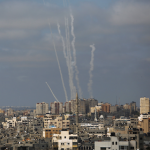While the world was watching the horrific scenes coming from Israel and Gaza, a comment made by President Biden’s National Security Adviser, Jake Sullivan,[1] a few days before the breakout of hostilities, stands out. It conveys, yet again, some of the current U.S. administration’s dystopic views concerning the changing world order.
He said: “The Middle East region is quieter today than it has been in two decades … the amount of time I have to spend on crisis and conflict in the Middle East today, compared to any of my predecessors going back to 9/11, is significantly reduced.”
How quiet the Middle East is, has become evident since Saturday, October 7th, 2023.
Years of U.S. neglect of the Israeli-Palestinian conflict (2014-2020) or its insensitive handling of the Abraham Accords is now seeing a tragic blow-back. A third, bloody and unpredictable front could open, even as Washington is attempting to manage the conflict in Ukraine and raising tensions with China.
Regardless of a possible escalation of the conflict, starting with an expansion of the hostilities to Lebanon with Hezbollah, and perhaps beyond, the geopolitical pattern of the region was already changing on its own.
Iran, Saudi Arabia, United Arab Emirates, and Egypt have joined the BRICS format making clear to the U.S. and Europe that at least the three Arab states are ready to sift through all the possible options in their foreign policy in an openly transnational manner. There are then no more permanent understandings with their traditional Western friends, but shifting interests and, accordingly, different policies inspired or attracted by a more multipolar vision of the world order. The Abraham Accords were only a shortcut for the U.S. and Israel to avoid dealing with an issue that they prefer to be marginalized forever.
It is still too early to say if the Al Aqsa Flood operation has changed the Middle Eastern landscape the same way the Ukraine conflict has done for the triangular relationship between the U.S., EU, and Russia. However, if an Israeli land invasion of Gaza should take place in the following hours or days, and Hezbollah act accordingly in the Northern front, the dynamics will change in unpredictable ways.
One fact is certain: this time Russia, China and India may play in an arena where the U.S. was accustomed to being a soloist.
BRICS-11 already controls 45% of global oil output. If next year Venezuela, Algeria, Nigeria, Kazakhstan, Indonesia should join too, this quota will increase. Most of these same countries will also control majority of the world’s commodities and the manufacturing capability for renewable energies. The geopolitical and geoeconomic implications could be massive.
The Middle East will then continue to be crucial, contrary to the views of some Western think tanks. That is why so many competing commercial, energy and technological corridors are emerging, such as those from the traditional Suez route to India-Middle East-Europe Corridor (IMEC), to the International North-South Transport Corridor (INSTC).
Europe should recover its traditional mediating role of advocating for ceasefire, dialogue, and negotiated solutions. On Oct 9, the U.S. and top European powers (UK, France, Germany, and Italy) issued a terse 271-word statement[2] concerning the tragic events unfolding in the Middle East. Just 37 words are dedicated to vaguely outlining a peace perspective and a political solution; not a hint to a ceasefire was included. Europe can do more. Its policy in the Middle East cannot be reduced to projecting attacked countries’ national flags on the façade of Governmental buildings.
How will the next events play out?
- Israel could launch a land invasion of Gaza, which will be catastrophic in terms of civilian casualties and humanitarian emergency.
- Hezbollah and other members of the so-called Axis of Resistance can react with coordination. The question is: is it just Lebanon or also Iraq and the Gulf area which are working against US interests?
- The U.S. could side with Israel by hitting the members of the Axis of Resistance.
- A possible escalation will affect Saudi Arabia’s calculus to continue talks with the US and Israel to join the Abraham Accords
- China, Russia, and India could, independently, decide to increase their political role in the region, calculating that siding too much with Israel the U.S. could weaken their potential role as peace brokers in the conflict.
Tectonic shifts are already underway. Global geopolitics has one hot front in Ukraine, a lukewarm one in the simmering U.S.-China relationship. The world doesn’t need a third one, leading to further destabilisation.
Marco Carnelos is Former Ambassador of Italy to Iraq, Special Envoy for Syria and the Middle East Peace Process.
This article was exclusively written for Gateway House: Indian Council on Global Relations. You can read more exclusive content here
Support our work here.
For permission to republish, please contact outreach@gatewayhouse.in
©Copyright 2023 Gateway House: Indian Council on Global Relations. All rights reserved. Any unauthorised copying or reproduction is strictly prohibited.
References
[1] The Atlantic, “How Democracy Can Move Forward, With Jake Sullivan and Will Hurd | The Atlantic Festival 2023″, YouTube Video, https://www.youtube.com/watch?v=_-qxXlHDDB0
[2] “Joint Statement from Quint Leaders on Israel: 9 October 2023″, News story, GOV.UK, October 9, 2023, https://www.gov.uk/government/news/joint-statement-from-quint-leaders-on-israel-9-october-2023#:~:text=Over%2520the%2520coming%2520days%252C%2520we,and%2520integrated%2520Middle%2520East%2520region


